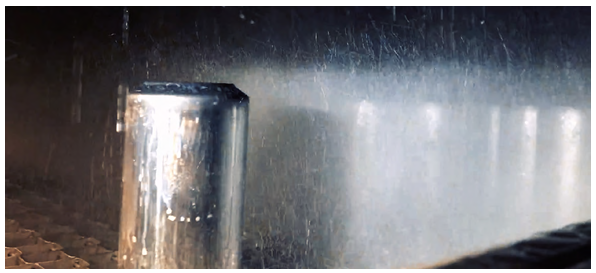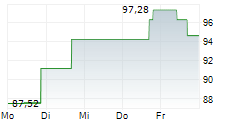
NORTHAMPTON, MA / ACCESSWIRE / March 5, 2024 / Crown Holdings, Inc.
Originally published in Crown Holding's 2022 Corporate Responsibility Report
Water scarcity is affecting an increasing number of regions worldwide. Our recognition of the need to use water with considerable care is the driver behind the Resource Efficiency pillar of our Twentyby30 sustainability program and grounds our comprehensive water stewardship strategy. We understand that we must be good stewards of this limited and shared resource that is vital to the well-being of the environment, human beings and business operations.
Our Use of Water
Water is used in many steps of our manufacturing and filling processes. In our facilities, it supports the forming, washing, rinsing and cooling of beverage cans and glass bottles, as well as the separation of sand for glass production. It is also an important element in the manufacture of aluminum and the production of the various beverages made by our customers. Even though Crown's facilities require freshwater inputs, most of this water returns to the water system and zero water is present in our final product. As a result, beyond evaporation, Crown does not consume water on its final products except for a minimal amount of water attached to the sand sub-product of the glass making process.
We source water from a combination of third parties, surfaces and wells, depending on the operating location. Once utilized, water is sent through an onsite wastewater treatment system prior to its discharge. While a few locations release directly into surface water areas, approximately 95% of our facilities discharge into third-party municipal wastewater treatment systems. Plants that treat wastewater on-site monitor at minimum biological oxygen demand ("BOD") and chemical oxygen demand ("COD") parameters, in addition to any parameters required by local discharge and/or operational permits. All discharge follows local regulations. In some cases, including our operations in Mexico and Brazil, the quality of the water discharged is superior to the water that is withdrawn.
Our Approach
With a diverse geographic footprint, environmental conditions vary from plant to plant. We identify waterrelated impacts by evaluating annually the specific data in each of our locations and developing action plans to address identified risks and opportunities. Our assessments include our incoming and outgoing water as well as the sources and points of discharge. Our water withdrawal is validated through an external third-party verification process. The World Resources Institute's (WRI) Aqueduct global water risk mapping function also helps us assess water stress and understand which of our sites are located in water-scarcity areas. These sites are subject to partnered replenishment projects, which aim to preserve watersheds for the importance they hold in the community and the environment. We have also signed the United Nation's CEO Water Mandate and committed to collective action to replenish 100 watersheds. This work aligns with our Twentyby30 goal to replenish 100% of water consumed from high scarcity watersheds by 2030.
Our Ambition
We aim to responsibly manage water for the long-term protection of the ecosystems and communities where we live and work. Our water stewardship strategy decreases the potential for business disruption while helping protect scarce resources at the watershed level by taking multiple actions including:
- Identifying and eliminating losses and leaks
- Identifying and incentivizing water reuse opportunities
- Piloting and replicating new and hybrid technologies toward Minimal to Zero Liquid Discharge
- Monitoring and recording wastewater quantity, quality, compliance and location of discharge
- Adopting company-wide standard operating procedures defining wastewater discharge quality and standard monitoring requirements
- Ensuring all employees have continued access to safe drinking water
- Ensuring all employees have continued access to sufficient and clean personal hygiene facilities, supplies and education
- Validating the number of plants in high water scarcity locations
- Identifying watershed level projects to implement in high water scarcity locations and executing these initiatives in collaboration with local partners
Compliance with local and national laws and regulations is a priority for Crown. Most of our locations are subject to strict national and local regulations on effluent quality. All incidents related to wastewater exceedances are registered and investigated, and corrective actions are implemented where necessary.
Crown plants and offices have readily available potable water that is unlimited and free of charge to employees. Sanitary facilities, including toilets and hand/face washing facilities, are also available across all our facilities.
"Our water stewardship strategy decreases the potential for business disruption while helping protect scarce resources at the watershed level"
Brazil Water Protection Project
The Piracicaba, Capivari and Jundiai (PCJ) Watershed is one of São Paulo's most important watersheds. Composed of three watersheds, Piracicaba, Capivari and Jundiai, it supplies drinking water for more than 10 million people. The PCJ Consortium is an intermunicipal consortium formed by constituents of the Piracicaba, Capivari and Jundiai Basins. It is a non-profit association which aims to recover the springs in its area of coverage.
In recent years, the PCJ region has faced a severe water crisis, resulting in a significant change in water consumption habits as well as land conservation efforts.
In 2022, Crown supported The Nature Conservancy (TNC) on a water conservation project called the São Paulo Water Fund to protect 100 hectares of forests in the Jundiai Mirim Watershed.
The São Paulo Water Fund - established in 2007 - is a broad initiative with several partners and is coordinated by TNC. The effort aims to create the institutional and financial conditions to support the implementation of nature-based solutions to increase water security in the São Paulo Metropolitan Region (RMSP). The goal is to improve the ecosystem health of the watersheds supplying drinking water to the region.
The water supply for Crown's Cabreúva facility is within the PCJ basin. The Jundiaí Mirim Watershed is a subbasin of the PCJ and is approximately 40 kilometers from Crown's plant.
To learn more about Crown Holding's commitment to corporate responsibility, visit our sustainability webpage.
For full details about Crown Holding's 2022 Sustainability Report, visit here.

View additional multimedia and more ESG storytelling from Crown Holdings, Inc. on 3blmedia.com.
Contact Info:
Spokesperson: Crown Holdings, Inc.
Website: https://www.3blmedia.com/profiles/crown-holdings-inc
Email: info@3blmedia.com
SOURCE: Crown Holdings, Inc.
View the original press release on accesswire.com



